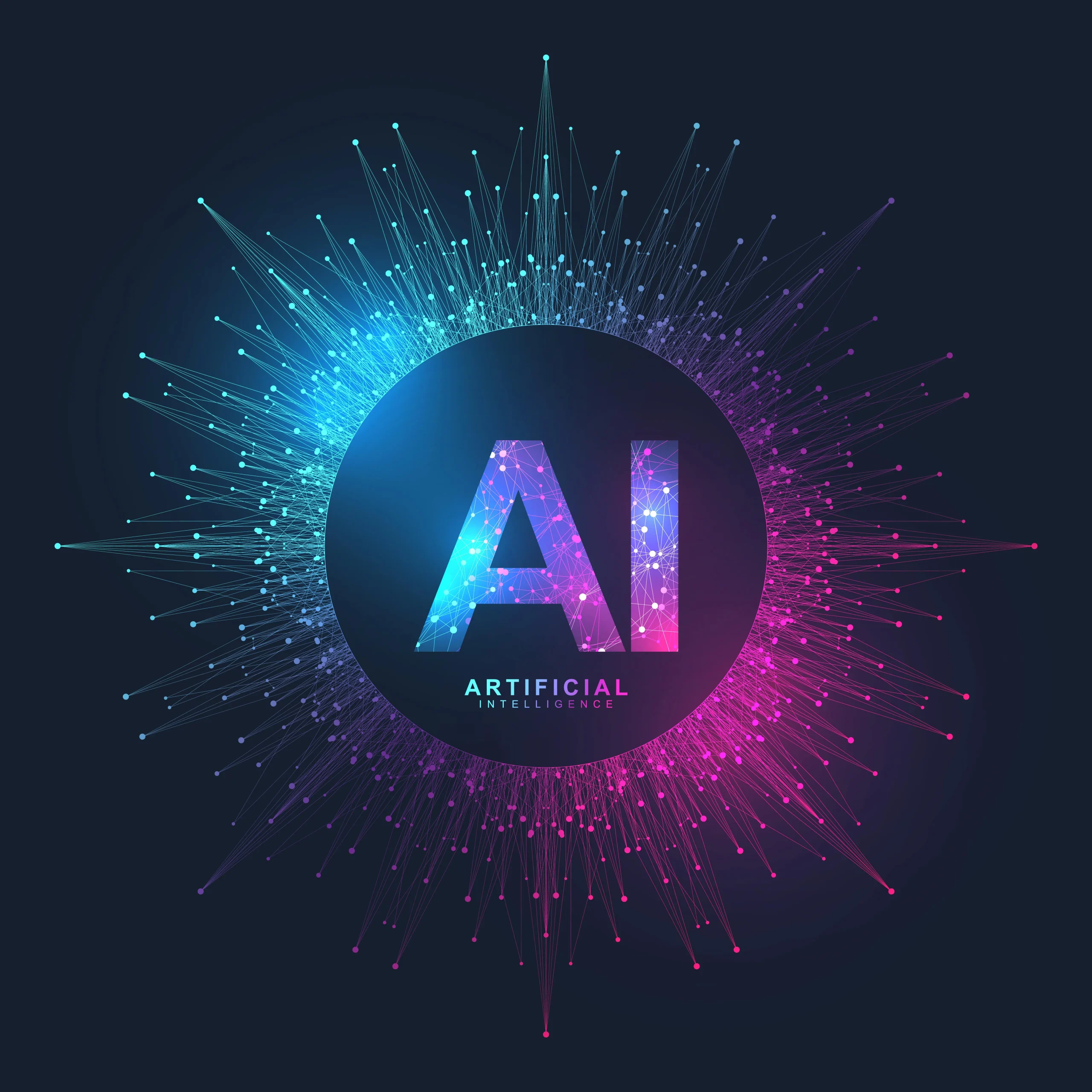ChatGPT vs Gemini vs Claude: Key Differences in 2025
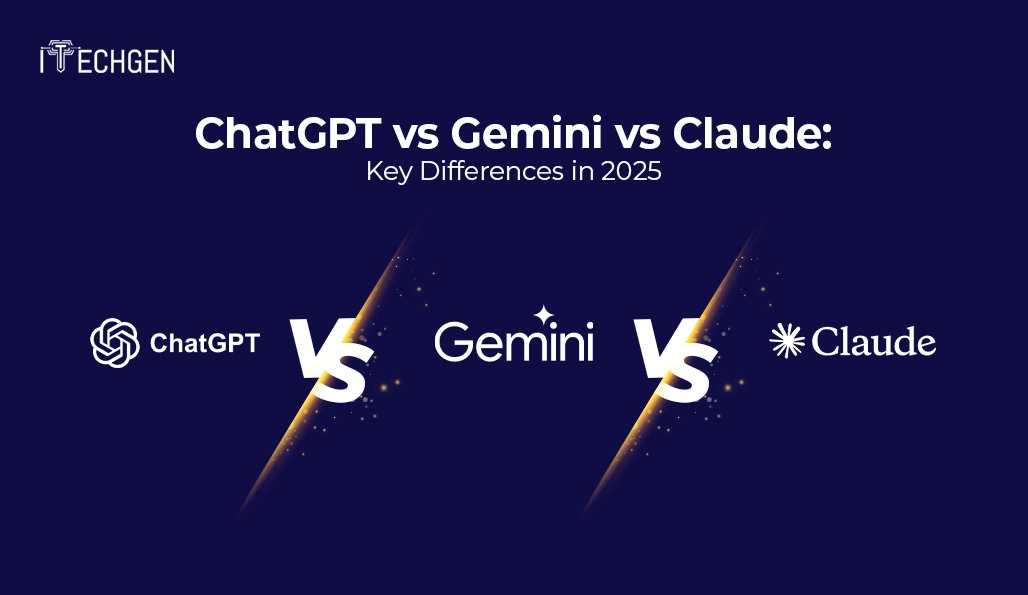
AI models are computer programs trained to understand, generate, or respond to human language and data. They don’t just follow commands — they learn patterns, improve over time, and help users complete tasks like writing, summarizing, planning, or even coding. These tools have grown from being simple chatbots to full-blown digital assistants that people now use daily.
In 2025, the use of AI models has skyrocketed. According to McKinsey’s 2025 Global AI Survey, 78% of organizations now use AI in at least one business function, a steady rise from 72% in 2024 and 55% in 2023. And it’s not just companies — students, teachers, marketers, and developers are all using them to work faster and smarter.
Among the most talked-about tools today are ChatGPT, Gemini, and Claude. Each one has its own way of working and solving problems. While ChatGPT is known for its versatility and user-friendliness, Gemini focuses on up-to-date answers, and Claude emphasizes safe, thoughtful responses.
So which one should you use? That depends on what you’re trying to achieve.
In this blog, we’ll break down the key differences between ChatGPT vs Gemini vs Claude—in simple words. You’ll get to know what these models are, how they help in real-life use cases, and which one suits your needs best.
Let’s start with the basics—what exactly are these models and how do they work?
Breaking Down ChatGPT, Gemini, and Claude for Everyday Users
Not everyone speaks the language of tech—and that’s okay. If you’ve been wondering about ChatGPT vs Gemini vs Claude, you’re not alone. These tools are now part of everyday tasks like writing, learning, and support. In 2025, knowing how they work can help you pick the one that actually fits your needs. Let’s learn some basic details about each model.
ChatGPT
ChatGPT is a conversational tool developed by OpenAI and launched in late 2022. It became a household name in 2023 with the release of GPT-4, and in 2024–25, businesses started using it beyond just chats—think content creation, coding help, customer support, and even product ideas. It’s like having a super-fast assistant that reads and writes really well. Many solopreneurs and small teams now use it to cut down time spent on emails, blogs, and repetitive tasks.
Gemini
Gemini is Google’s AI model, officially rebranded and launched under the Gemini name in December 2023 as a successor to Bard. It stands out for its tight integration with Google tools like Docs, Gmail, and Search. For everyday users, this means you can brainstorm inside your documents, get writing suggestions while replying to emails, or even simplify complex research using Google’s knowledge graph. Students, researchers, and content teams love Gemini for how well it pulls in real-world info.
Claude
Claude is built by Anthropic and first came out in March 2023. It’s named after Claude Shannon, the father of information theory. Unlike others, Claude focuses more on safety and context, making it a strong choice for long-form writing, ethical reasoning, or sensitive business use. By 2025, Claude’s newer versions are being used in law firms, education platforms, and even HR departments to assist with policy drafting or reviewing detailed reports.
Everyday Benefits of AI Models: ChatGPT vs Gemini vs Claude
When you look at tools like ChatGPT vs Gemini vs Claude, it’s clear that AI models are now everyday problem-solvers. From writing emails and simplifying homework to planning schedules or answering customer queries—they help cut down repetitive work. Small businesses use them to reply faster, students get quick summaries, and even shop owners create product descriptions in minutes. These tools aren’t made for tech experts—they’re built to make everyday tasks easier, save time, and reduce stress so you can focus on bigger goals.
Quick Comparison: ChatGPT vs Gemini vs Claude (2025 Update)
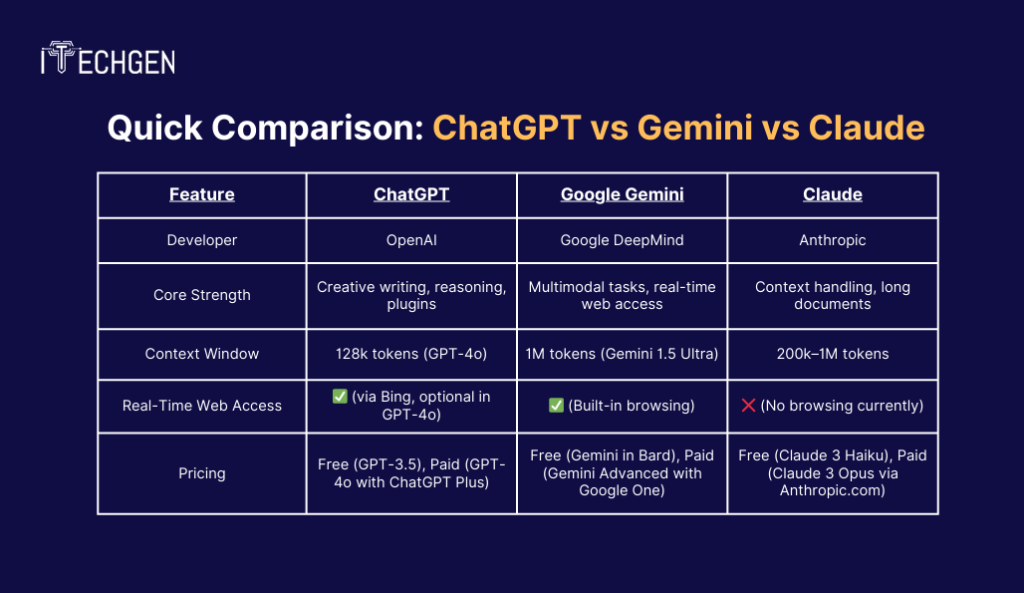
If you’re stuck choosing between ChatGPT vs Gemini vs Claude, this quick table breaks down their most useful features in plain terms. From pricing and real-time access to how much context each model can handle, it helps you match the right tool to your needs—whether it’s content creation, research, or productivity.
| Feature | ChatGPT | Google Gemini | Claude |
| Developer | OpenAI | Google DeepMind | Anthropic |
| Core Strength | Creative writing, reasoning, plugins | Multimodal tasks, real-time web access | Context handling, long documents |
| Context Window | 128k tokens (GPT-4o) | 1M tokens (Gemini 1.5 Ultra) | 200k–1M tokens |
| Real-Time Web Access | ✅ (via Bing, optional in GPT-4o) | ✅ (Built-in browsing) | ❌ (No browsing currently) |
| Pricing | Free (GPT-3.5), Paid (GPT-4o with ChatGPT Plus) | Free (Gemini in Bard), Paid (Gemini Advanced with Google One) | Free (Claude 3 Haiku), Paid (Claude 3 Opus via Anthropic.com) |
User Base Breakdown: Who’s Using What & Why?
Understanding who uses each model—and why—can help you pick the right fit for your needs. When it comes to ChatGPT vs Gemini vs Claude, the user base is quite varied, reflecting how differently each tool performs in real-world settings.
ChatGPT is widely used by content creators, small business owners, and freelancers who need quick help with writing, brainstorming, or summarizing tasks. Its plug-and-play feel makes it ideal for those who want instant results without much setup.
Gemini fits naturally into workplaces that already rely on Google tools. Teams who work on shared documents, presentations, and emails prefer Gemini for its real-time integration and smart automation.
Claude appeals most to people who work with long reports or sensitive topics. From researchers to policy analysts, users value its ability to handle big files while keeping the tone respectful and thoughtful.
Choosing between ChatGPT vs Gemini vs Claude depends on what you do daily—whether it’s writing content, handling office work, or dealing with complex research files.
| User Type | Why They Use ChatGPT | Why They Use Gemini | Why They Use Claude |
| Small Businesses | Affordable for daily writing, coding help, and content ideas. | Integrates well with Google tools like Docs and Sheets. | Clear explanations, safe outputs, and summary features. |
| Content Creators & Writers | Strong at brainstorming, summarizing, and creative writing tasks. | Helpful for visual tasks, image descriptions, and presentations. | Handles long documents smoothly with clean responses. |
| Students & Educators | Quick explanations, essay support, and language learning. | Good at researching topics with up-to-date web access. | Great for reading comprehension and summarizing lessons. |
| Customer Support Teams | Handles queries, writes clear responses, and works with plugins. | Strong document understanding and helpful integration with Workspace. | Trusted for ethical outputs in sensitive chats. |
| Tech Teams & Developers | Supports coding, APIs, and test environments. | Used for multimodal tasks—coding, video, image processing. | Preferred for safety-first policies and long-form reading tasks. |
Speed, Memory, and Accuracy: Who Wins the Performance Game?
When it comes to performance, ChatGPT vs Gemini vs Claude each have their own strengths. Claude 3 Opus is known for handling long-form tasks with fewer context breaks, which makes it ideal for working with research papers or legal documents. Users on Reddit often praise Claude for its ability to “remember the entire flow” without losing earlier points. Gemini, on the other hand, is appreciated for being fast and seamless—especially when integrated with Google Workspace apps. Real users love how quickly it summarizes Gmail threads or generates responses in Docs. ChatGPT, particularly in its GPT-4o version, balances accuracy and creativity well but sometimes gets feedback for hallucinating under heavy prompts. The choice here depends on your work: Claude for long reads, Gemini for quick office tasks, and ChatGPT for smart replies with creative angles.
| Feature | ChatGPT | Google Gemini | Claude |
| Response Speed | Fast (especially GPT-4o) | Moderate to Fast | Fast |
| Context Memory | 128k tokens | 1M tokens (Ultra) | 200k–1M tokens |
| Accuracy in Complex Tasks | Very High | High | High (Claude 3 Opus) |
Interface Experience: Which AI Feels More Human?
If you’ve ever felt like talking to an AI was just filling out a form, you’re not alone. The interface can make or break the experience. Among ChatGPT vs Gemini vs Claude, many Reddit users find Claude to be the most “human” in tone—clear, structured, and polite, almost like a thoughtful co-worker. Gemini feels more like a productivity tool—it’s helpful, but a bit too robotic at times, especially in casual chats. ChatGPT strikes a middle ground. With system messages and memory settings in GPT-4o, users say it’s easier to “train” ChatGPT to talk the way they want. For people managing client chats, internal notes, or creative sessions, the tone really matters. If human-like conversation is your priority, Claude takes the lead—but ChatGPT isn’t far behind.
| Feature | ChatGPT | Google Gemini | Claude |
| Ease of Use | Simple, user-friendly | Tied to Google UI | Clean & minimal |
| Tone Naturalness | Conversational | Professional | Empathetic & safe |
| User Customization | Custom GPTs | Workspace integrated tools | Limited customization |
Data Privacy and Transparency: Which One Keeps You Safer?
Data privacy is no longer a side issue—it’s front and center. Comparing ChatGPT vs Gemini vs Claude, Claude earns points for being more transparent. Users highlight Anthropic’s “Constitutional AI” approach, which is built to minimize biased or unsafe outputs. Gemini, being Google’s product, comes with all the pros and cons of data tied to a massive ecosystem. Some Reddit users express concern about how their data might be used across Google services. ChatGPT gives more user control, especially with custom GPTs, but there are concerns over OpenAI’s partnership with Microsoft. If you’re handling sensitive business or client information, Claude might feel safer. But if you’re already deep into Google’s world, Gemini might still be worth it—just check your settings.
| Feature | ChatGPT | Google Gemini | Claude |
| Data Handling Transparency | Partial | Strong policies (Google standards) | High transparency |
| User Data Control | Control via settings | Synced with Google Account controls | Clear opt-in policies |
| Safety & Moderation | RLHF-based | Built-in filters | Constitutional AI |
Offline Use, API Power, and Tool Integration
This is where the tools really start to differ. ChatGPT vs Gemini vs Claude each offer different levels of flexibility. ChatGPT Integration and plugin ecosystem are mature and widely used. Developers on YouTube and Reddit often mention building workflows that automate everything from content creation to data cleanup using OpenAI APIs. Gemini’s integration with Workspace apps is seamless, which is a huge plus for teams that live in Google Docs, Sheets, and Gmail. Claude currently lacks offline or deep integration support, which is a major drawback for technical users. If your goal is building tools or embedding AI into daily business tasks, ChatGPT is the most flexible. For document-focused teams, Gemini wins on convenience. Claude, while solid in replies, still has catching up to do here.
| Feature | ChatGPT | Google Gemini | Claude |
| Offline Functionality | No | No | No |
| API Availability | Robust API | Vertex AI API | Claude API |
| 3rd Party Integration | Plugins & tools | Workspace integration | Basic tool compatibility |
Pricing, Tokens & Free Tier Limits: What Are You Really Paying For?
Understanding what you get for free—or don’t—is key. In ChatGPT vs Gemini vs Claude, ChatGPT has a generous free tier with GPT-3.5 and limited GPT-4o access, making it popular with students and freelancers. Gemini offers access to Gemini 1.5 in Bard or Workspace accounts, but usage limits can kick in quickly. Claude’s Sonnet and Haiku models are free, but the best performance (Claude 3 Opus) is behind a paywall. Users often express frustration on Reddit when a model “suddenly stops responding” due to token limits or free-tier caps. For businesses or heavy users, ChatGPT’s paid tier offers the best value with access to custom GPTs and APIs. Claude is ideal for reading-heavy tasks, while Gemini balances between productivity and cost—especially if your team already uses Google Workspace.
| Feature | ChatGPT | Google Gemini | Claude |
| Free Tier | Yes (GPT-3.5, GPT-4o) | Yes (in Bard/Workspace) | Yes (Haiku, Sonnet) |
| Token Limits | 128k (GPT-4o) | 1M tokens (Ultra) | Up to 1M (Opus) |
| Paid Plan Options | $20/mo ChatGPT Plus | Included in Google One, etc. | API-based pricing |
Creativity Tests: Who’s Better at Writing, Coding, and Visual Thinking?
When tested for creative work—like storytelling, brainstorming app ideas, or even debugging code—ChatGPT often leads in raw imagination. Creators on YouTube call it their “go-to” for idea generation. Gemini, thanks to Google’s massive training data, performs better at structured tasks like summarizing emails, creating slide decks, or even writing blog outlines. Claude shines in long-form clarity. It won’t give flashy ideas, but it’s great for step-by-step reasoning or policy writing. In short, if you need creative sparks, ChatGPT is strong. If you want balanced structure, go for Gemini. If you need careful logic, Claude is ideal. Each model adds a different value based on the kind of task you’re tackling.
| Feature | ChatGPT | Google Gemini | Claude |
| Writing Skills | Excellent | Strong | Great for summaries |
| Coding Help | Very reliable | Great with Google tools | Good |
| Visual Thinking | Image input/output in GPT-4o | Video + image understanding | Basic image inputs |
Fine-Tuning and Personalization: Can You Train It Your Way?
Personalization is where the experience gets richer—or more frustrating. Between ChatGPT vs Gemini vs Claude, ChatGPT currently offers the best customization tools. You can create custom GPTs with your own instructions, knowledge base, and behavior. Freelancers and agencies often use these to streamline repetitive tasks. Gemini is improving but still doesn’t give much freedom beyond prompt tweaking. Claude focuses on consistent, safe replies, which means less personalization—but fewer surprises too. If you’re looking to build tools for a niche industry or personal workflow, ChatGPT is your best bet. But if reliability and tone consistency are your priority, Claude may be enough. Gemini sits in the middle—great if you use other Google tools, but still catching up on flexibility.
| Feature | ChatGPT | Google Gemini | Claude |
| Custom Training | Custom GPTs & memory | Limited | No custom model |
| Tone Adjustment | Yes | Experimental tone control | Constitutional guidance |
| Memory Features | User memory (on/off) | Tied to user profile | Retains session memory |
AI Model Evaluation Metrics: How We Scored ChatGPT vs Gemini vs Claude
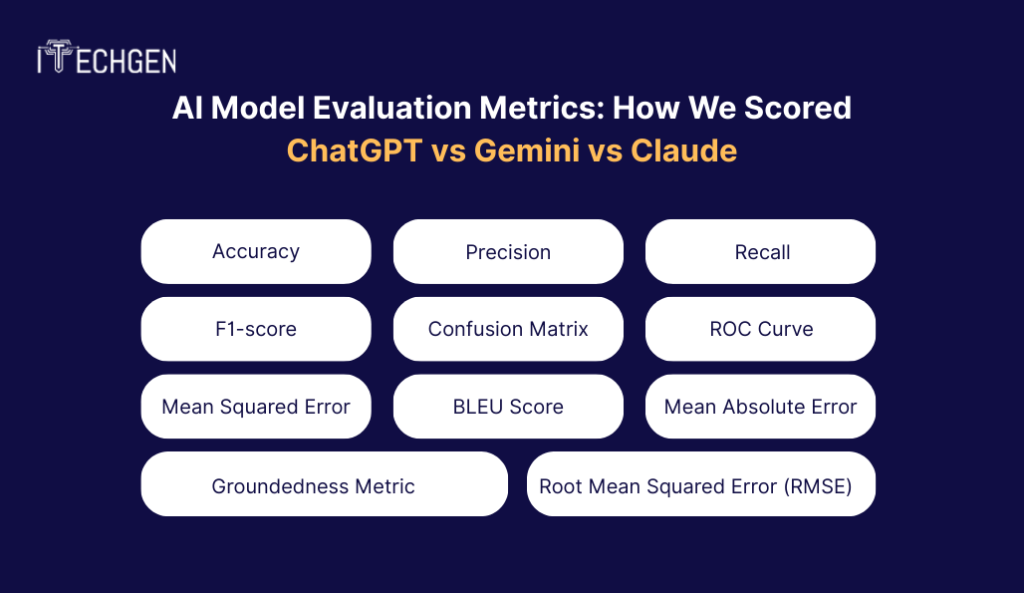
When comparing ChatGPT vs Gemini vs Claude, it’s not just about which tool gives answers faster—it’s about which one gives better answers, more often. From customer support to content creation and business analytics, performance benchmarks help us understand how these models handle real-world tasks. Whether you’re running a small business or managing a classroom, knowing how they score on accuracy, reliability, and logic can help you pick the model that’s truly built for your needs.
Accuracy: Accuracy tells us how often the model gets things right. For example, if you ask 100 questions and the model answers 90 of them correctly, that’s 90% accuracy. This is useful when you want an overall idea of how dependable the tool is, especially in straightforward tasks like grammar correction or email replies.
Precision: Precision focuses on how careful the model is when it claims something is true. Imagine you’re using it to detect spam or filter out fake reviews—if the model marks something as a problem, precision tells you how often it’s actually correct. High precision helps avoid false alarms in tasks where every wrong alert can waste time.
Recall: While precision is about being careful, recall is about being thorough. If you’re using an AI model to pull out all urgent customer complaints from 1,000 reviews, recall shows how many of those real issues it actually found. It’s crucial when missing something important—like a critical support ticket or fraud alert—can cost you.
F1-score: This is the balance between precision and recall. It’s like saying, “Don’t just be right, also be complete.” A high F1-score means the model isn’t just guessing randomly or being overly cautious—it’s performing well on both fronts. It’s great when you’re working with messy, real-world data where both accuracy and coverage matter.
Confusion Matrix: Think of this as a truth table for the model. It breaks results into categories like right answers, wrong answers, and confusing ones. If you’re testing ChatGPT vs Gemini vs Claude for something like medical classification or document tagging, the confusion matrix shows where each model shines—or stumbles.
ROC Curve: The ROC curve is a visual tool that shows how well a model separates good results from bad ones. It’s especially useful in decision-making scenarios like credit scoring or spam filtering, where the cost of false positives and false negatives can be very different. A model with a better ROC curve helps reduce those trade-offs.
Mean Squared Error (MSE): MSE is used when the model predicts numbers instead of categories. It adds up the squared differences between what the model predicted and what actually happened. Larger mistakes count more, making it good for finding out if a model is way off. For example, if you’re forecasting sales or pricing, lower MSE is better.
Root Mean Squared Error (RMSE): RMSE is just the square root of MSE, but it gives you the error in the same unit as your data. So if you’re predicting delivery times in minutes, this tells you on average how many minutes off the model is. It’s easy to interpret and gives a feel for everyday accuracy.
Mean Absolute Error (MAE): Unlike MSE, MAE treats all errors equally. It adds up how wrong the model was each time and gives an average. This is more forgiving of occasional big mistakes. For example, in temperature prediction or budgeting tools, MAE is a useful way to check if results are consistently close to the truth.
BLEU Score: Used mostly in translation and content generation, BLEU compares what the model wrote with what a human might say. A higher score means the model sounds more natural. If you’re comparing ChatGPT vs Gemini vs Claude for writing product descriptions, summaries, or translations, this metric highlights how readable and human-like the output is.
Groundedness Metric: Groundedness measures whether the model’s answers are based on real facts or just sound convincing. This matters a lot when the task involves sensitive topics like health, finance, or legal advice. A grounded model sticks to what it knows and doesn’t make things up—a key point raised by users relying on AI in their daily work.
| Metric | ChatGPT | Gemini | Claude |
| Classification Accuracy | High | Very High | Moderate |
| Precision | Balanced | Highest | Moderate |
| Recall | High | Moderate | Highest |
| F1-Score | High | High | Moderate |
| MSE (Regression) | Low | Lowest | Moderate |
| RMSE (Regression) | Low | Lowest | Moderate |
| MAE (Regression) | Low | Low | Lowest |
| BLEU Score | High | High | Moderate |
| Groundedness | High | High | Highest |
Common Complaints: What Users Hate Most About Each Model
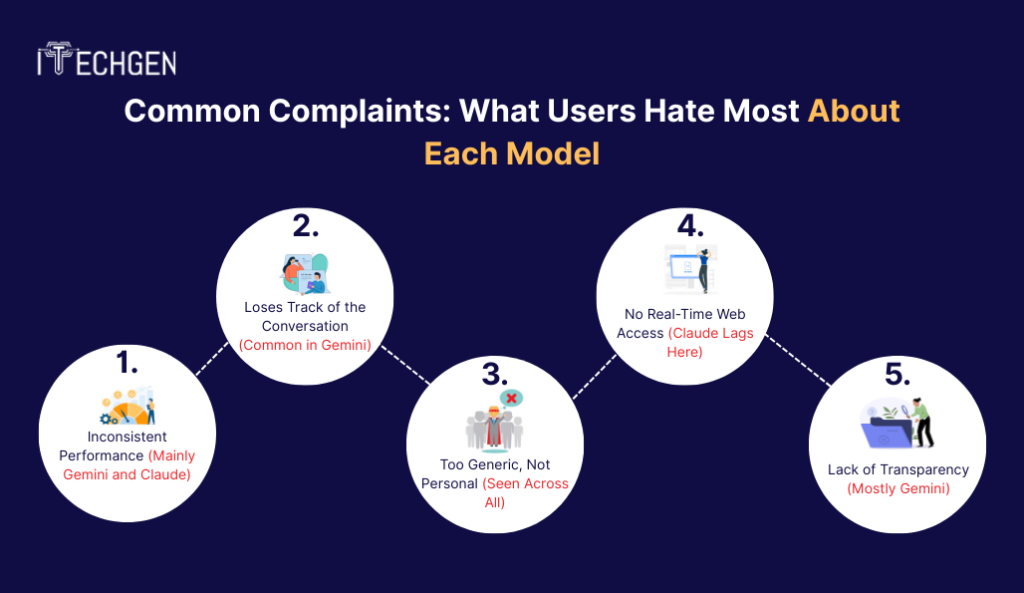
When it comes to ChatGPT vs Gemini vs Claude, the internet is full of opinions—and not all of them are glowing. While these AI models are shaping the way we work, write, and search, real users on Reddit, Quora, and YouTube have pointed out where things fall short. From inconsistent responses to lack of transparency, these complaints reveal what happens when everyday expectations don’t match real-world performance. The good news? One model’s weakness is often another’s strength—and knowing this can help you choose smarter.
1. Inconsistent Performance (Mainly Gemini and Claude)
Many users say Gemini sometimes gives half-baked or robotic replies, especially in creative writing or storytelling. Claude too, while generally safer and well-structured, occasionally “plays it too safe” and gives vague answers—especially when the topic gets even slightly controversial.
Where ChatGPT helps: OpenAI’s ChatGPT (especially GPT-4 and GPT-4o) tends to be more stable across different task types. Whether it’s a poem, email, or a how-to guide, its responses are usually more polished and complete. That’s why many users still prefer ChatGPT for day-to-day writing.
2. Loses Track of the Conversation (Common in Gemini)
Gemini, though powerful, often struggles with long threads. Redditors have pointed out that it forgets context quickly and sometimes repeats itself.
Where Claude helps: Claude 3, especially Opus, is known for handling longer chats better. It can manage documents and retain details over extended prompts, making it a better fit for reading contracts, summarizing reports, or tutoring sessions.
3. Too Generic, Not Personal (Seen Across All, Worst in Claude)
Claude is polite—but often “too polite.” Users say it avoids strong opinions and gives cookie-cutter responses. Gemini tries to adapt but lacks deep personalization.
Where ChatGPT helps: ChatGPT’s custom instructions and “Custom GPTs” allow users to tweak tone, context, and even preferred format. It’s useful for creators and teams who want AI that sounds like them.
4. No Real-Time Web Access (Claude Lags Here)
Claude users feel left behind when they need up-to-date information. Since Claude doesn’t browse the web, it can’t answer questions about current news or trending tools.
Where Gemini and ChatGPT help: Both offer built-in browsing—Gemini through Google and ChatGPT via Bing or its pro tier. If you’re in a fast-moving space like crypto, news, or tech, real-time access is essential.
5. Lack of Transparency (Mostly Gemini)
Some Gemini users are confused about why the model gives certain answers. It doesn’t explain itself well. There’s also concern about how Google might use input data.
Where Claude helps: Claude was built on the idea of “Constitutional AI,” where it tries to explain its reasoning and remain honest—even if that means admitting it doesn’t know something. This builds trust, especially in legal or academic use cases.
These pain points matter because they reflect real-world frustration—from students to business owners. While no model gets everything right, understanding these gaps can help users pick the right one for their needs—and avoid wasting time or energy.
Which One Is Evolving Fastest?
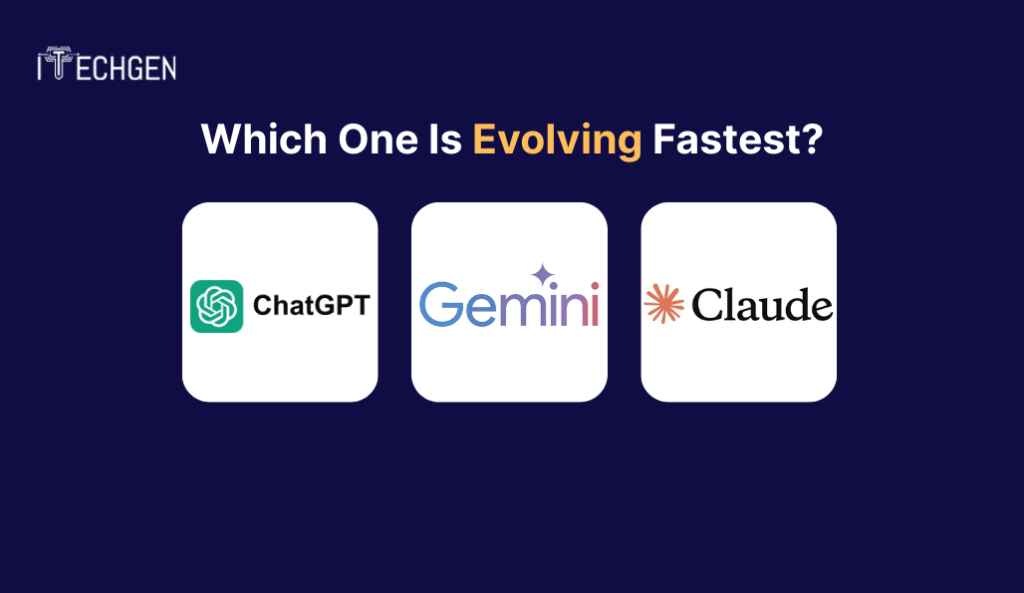
When it comes to ChatGPT vs Gemini vs Claude, staying up to date isn’t just a bonus—it’s a necessity. These tools are constantly being fine-tuned to offer smarter answers, smoother interactions, and better performance. But not all three evolve in the same way. While one focuses on rapid releases, another bets on ecosystem upgrades, and the third prioritizes safety and thoughtful use. Here’s how they compare when it comes to real-world progress:
- ChatGPT (OpenAI): OpenAI’s ChatGPT stands out for frequent updates and user-driven features. From voice chats to custom GPTs, the model evolves fast and publicly. It’s especially helpful for creators, developers, and business users who benefit from cutting-edge releases that solve real problems.
- Gemini (Google): Gemini grows by becoming part of the apps people use daily—like Gmail, Docs, and Google Meet. Instead of just adding new tools, it quietly improves your existing workflows. If you’re already in the Google ecosystem, you’ll notice it becoming smarter over time without needing to learn something new.
- Claude (Anthropic): Claude evolves more cautiously. Its upgrades focus on long-form understanding, safe interactions, and clarity. It may not roll out features as quickly, but it improves in ways that matter to researchers, writers, and teams that rely on high-quality, reliable output.
If you’re after the newest tools and constant updates, ChatGPT is your pick. Prefer background improvements inside tools you already use? Gemini fits best. Need thoughtful, safe answers with less noise? Claude keeps it steady.
Final Verdict
Choosing between ChatGPT vs Gemini vs Claude isn’t just a tech debate anymore—it’s a real-world decision that impacts how students study, how businesses create content, and how everyday users interact with information. After exploring real feedback from Reddit, Quora, and YouTube, one thing is clear: no single model wins across the board. ChatGPT stands out for creativity and conversational tone, but users often complain it can go off-track or sound overconfident. Gemini, on the other hand, is great for productivity tasks and Google integration, yet users say it sometimes lacks depth in responses. Claude is praised for its clarity and safe replies, but that same safety can make it less flexible in complex or sensitive topics. Ultimately, these tools are here to help, not replace. And when you understand their strengths, weaknesses, and ideal use cases, they become powerful assistants—not just fancy apps.

Pankaj Arora (Founder & CEO)
Pankaj Arora is the Founder & CEO of iTechGen, a visionary leader with a deep passion for AI and technology. With extensive industry experience, he shares expert insights through his blogs, helping businesses harness the power of AI to drive innovation and success. Committed to delivering customer-first solutions, Pankaj emphasizes quality and real-world impact in all his endeavors. When not leading iTechGen, he explores emerging technologies and inspires others with his thought leadership. Follow his blogs for actionable strategies to accelerate your digital transformation and business growth.
View More About Pankaj Arora
